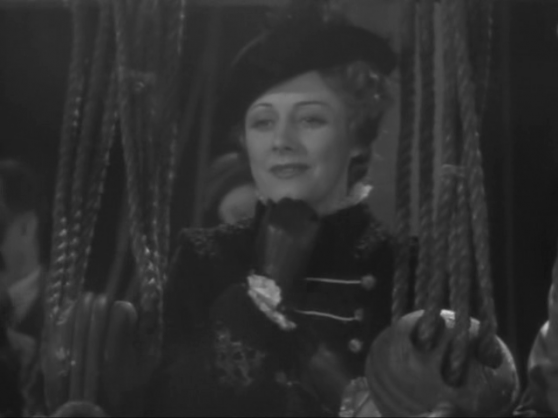The Age of Innocence (1934): Subtraction by addition

The Age of Innocence‘s 1934 iteration is an interesting prospect. The stymied romance between old-money lawyer Newland Archer (John Boles) and his bland but correct fiancée’s bohemian cousin Ellen Olenska (Irene Dunne), recently escaped from her European husband’s clutches, is a carefully assembled collection of glances, triple entendres, and turnings away toward fireplaces; it’s difficult at best to make the “action” of 1870s New York society exterior enough for film. (Even Martin Scorsese’s excellent, heartbreaking rendition required a voice-over.) How does director Philip Moeller — better known for his work on Broadway — propose to arrange Edith Wharton’s subtleties to their necessary height in 85-ish minutes? “Each time you happen to me all over again,” Archer tells Ellen. But can she happen to him enough times in an hour and a half to compel the audience to care?
She could have; she doesn’t. Margaret Ayer Barnes adapted Wharton’s novel into a stage play, apparently, and the screenplay of AoI ’34 seems derived largely from that elided version of the story. The sequences and characters dropped aren’t any great loss per se, but the elegiac meaning of the original is in the accumulation of missed chances and unspoken pains, not in any one — and what replaces them here is high-pitched exposition that reduces the story to why-bother melodrama. Part of what makes The Age of Innocence so wonderfully bleak is the idea that, when Society moves between Archer and Ellen, it does so unwittingly, like continental drift, or a mother putting her arm across the front seat when she brakes sharply. Here, it’s not only witting; it’s the subject of parlor meetings, and May’s (Julie Haydon) doltish letters home during her and Archer’s honeymoon. And it’s hard to know what to make of the “comic” interlude featuring Mrs. Manson Mingott (Helen Westley, otherwise delightful) and Ellen’s maid. It plays like one of those hammy filler sequences in a kung-fu movie where a tertiary bad guy gets backslapped into a barrel of water by a grade-schooler in the marketplace, and you have to wonder what worthwhile passage got cut in favor of showcasing antiquely -ist attitudes towards Italians.
More performances like Dunne’s might have helped. She starts out in a Mae West direction with her portrayal of Ellen, then steers it to a sadder place with fuller silences. (One of the elements sacrificed for tacked-on exposition is the Ellen/May relationship. Haydon is quite good with two-note writing; I’d have liked to see her in more scenes with Dunne.) Archer is a tricky role, but grading on that curve and a period one still don’t help Boles much, given his propensity to jut his chin in lieu of acting; the framing device that opens the film does do him the favor of contrasting his performance with that of Kane Richmond as his grandson, though. The IMDb informs me that Richmond died the day I was born, so I feel a strange pang of guilt here, but he’s dreadful — line readings like a dugout canoe (wooden; hollow), and he’s wearing a fedora the size of a manhole cover.
Wharton is always a challenge to translate to film; the mind’s eye works on her prose in a way the camera’s sometimes can’t. (Scorsese’s came the closest.) Moeller’s AoI is interesting, if only to see why that’s true, but on a qua-movie basis, it’s inessential if you don’t know the novel, and insufficient if you do.
Tags: Edith Wharton Helen Westley Irene Dunne It's Log John Boles Julie Haydon Kane Richmond Mae West Martin Scorsese movies Philip Moeller The Age of Innocence






Thanks for this Sarah – I didn’t even know this movie existed! And I am huge fan of Irene Dunne; have you seen “The Awful Truth”? One of my favorites. I’ll have to check this out soon.
And as long as I’m here – thank you for all of your excellent writing, your hilarious tweets, your “Hoarders” commiseration, and all-around greatness. Happy Holidays!!
Thanks, @Another Sarah!
I read the book this summer from a much older and more experienced perspective than I could have ever had when Scorcese’s movie came out. Good lord, I cried my eyes out. It did make want to see the Scorcese movie again, though. On this, however, I will take a pass.
Hello,I’m working on my thesis and I need the shooting script of this movie (The Age of Innocence) unfortunately I couldn’t find on the net specially the 1934’s version,who can help me in this case?